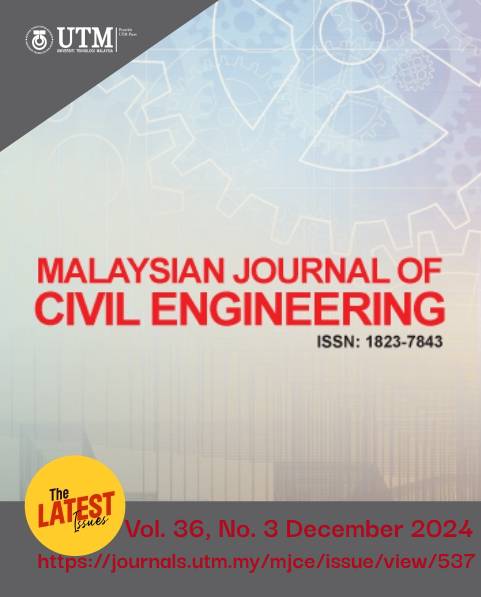MORPHODYNAMIC CHARACTERISTICS OF A SANDY BED MEANDERING CHANNEL AT DIFFERENT DISCHARGES
DOI:
https://doi.org/10.11113/mjce.v36.23048Keywords:
meandering channel, mobile bed, fixed walls, inbank flow, Manning's n, velocity distribution, morphological changesAbstract
Transportation of sediment is a critical issue in riverine environments, particularly in meandering channels where flow dynamics are complex. However, information regarding erosion and deposition processes in meandering channels is still limited. Therefore, an experimental investigation on the influence of discharge variation on the morphodynamics of a meandering channel has been carried out. The experimental investigation was conducted at the Hydraulic and Hydrology Laboratory, UTM Johor Bahru. The study investigates the flow profiles and the morphological changes of inbank flow conditions represented by shallow and deep flow depths. The findings revealed that Manning’s n in a deep flow depth was 60.12% higher than a shallow flow depth. Moreover, velocity at the channel bend was increased by 8.3% to 14.6% compared to the crossover along the channel. This indicates that the geometrical planform plays a crucial part on the variability of velocity in the channel. Therefore, the outcomes of this study could provide more effective river management strategies to resolve erosion and deposition issues in river engineering studies.
References
Pan, Y., Liu, X., & Yang, K. 2022. Effects of discharge on the velocity distribution and riverbed evolution in a meandering channel. Journal of Hydrology, 607.
Rismani, N., Afzalimehr, H., Asghari-Pari, S.-A., Nazari-Sharabian, M., & Karakouzian, M. 2024. Influence of a Meandering Channel on the Threshold of Sediment. Water, 16(15): 2162.
Dey, S. 2014. Fluvial Hydrodynamics.Springer
Ferguson, R. I., Hardy, R. J., & Hodge, R. A. 2019. Flow resistance and hydraulic geometry in bedrock rivers with multiple roughness length scales. Earth Surface Processes and Landforms, 44(12): 2437-2449.
Elmoaty, M. S., & Elsamman, T. 2020. Manning roughness coefficient in vegetated open channels. Water Science. 34(1): 124-131. DOI:10.1080/11104929.2020.1794706
Termini, D. 2015. Momentum transport and bed shear stress distribution in a meandering bend: Experimental analysis in a laboratory flume. Advances in Water Resources, 81, 128-141.
Silva, A. M., & Ebrahimi, M. 2017. Meandering morphodynamics: Insights from laboratory and numerical experiments and beyond,. Journal of Hydraulic Engineering, 143(9): 03117005.
Prandhan, B., Pradhan, S., & Khatua, K. K. 2024. Experimental investigation of three-dimensional flow dynamics in a laboratory-scale meandering channel under subcritical flow condition. Ocean Engineering. 302: 117557.
Ismail, Z. 2007. A study of overbank flows in non-vegetated and vegetated floodplains in compound meandering channels. Loughborough University.
Jumain, M., Ibrahim, Z., Makhtar, M. R., Ishak, R., Rusli, N. M., & Salleh, M. Z. 2022. Spatio-Temporal Patterns of Saltwater Intrusion in A Narrow Meandering Channel. International Journal of Integrated Engineering. 14(9): 188-194.
Udin, W. S., Ahmad, A., & Ismail, Z. 2014. Assessment of digital camera in mapping meandering flume using close range photogrammetric technique. Science & Technology. 22(1).
Ibrahim, Z., Sa'ari, R., Jumain, M., MAsri, M. N., Aris, M. A., Amzah, N. A., . . . Alias, N. 2020. The Hydraulics and Morphodynamics of a Flooded Meandering Channel. Proceedings of AICCE'19, 53: 1459-1472. DOI:10.1007/978-3-030-32816-0_111
Jumain, M., Ibrahim, Z., Ismail, Z., Harun, S., Makhtar, M. R., Rahman, M. S., . . . Anuar, M. Z. 2018. Transportation Of Bed Load And Its Formation For Inbank Flow: A Physical Modelling Approach. Malaysian Journal of Civil Engineering, 27(2).
Spiliotis, M., Kitsikoudis, V., Kirca, V. O., & Hrissanthou, V. 2018. Fuzzy threshold for the initiation of sediment motion. Applied Soft Computing, 72: 312-320.
Jumain, M. 2017. Flood Hydraulics In Riparian Vegetated Mobile And NonMobile Bed Straight Channels. Universiti Teknologi Malaysia.
Kumar, A., Pradhan, B., & Khatua, K. 2022. Analysis of Flow Properties Along a Rectangular Meandering Channel in A Gravel Bed.
Lugina, F. P., Uchida, T., & Hatono, M. 2021. Effect of channel meander on flow resistance. Journal of Japan Society of Civil Engineers, 77(2): I865-I870.
Tahmid, A., Rahman, M. H., Mounota, S., & Ahsan, K. A. 2021. Relationship between Manning Roughness Coefficient and Flow Depth in Bangladesh Rivers. Malaysian Journal of Civil Engineering, 33(3): 51-58.
Pradhan, A., Khatua, K. K., & Dash, S. S. 2015. Distribution of depth-averaged velocity along a highly sinuous channel. Aquatic Procedia, 4: 805-811.
Beheshti, A., & Ataie-Ashtiani, B. 2008. Analysis of threshold and incipient conditions for sediment movement. Coastal Engineering, 55(5): 423-430.
Seminara, G., Lanzoni, S., & Tambroni, N. 2023. Theoretical Morphodynamics: River Meandering. Firenze University Press DOI:10.36253/979-12-215-0303-6
Pinasti, N. W., Wijayanti, E., Nurfaida, W., Sulaiman, M., & Kurniawan, A. 2024. Flow patterns at river bends and its response to surrounding infrastructures. IOP Conference Series: Earth and Environmental Science, 1311(1). DOI:10.1088/1755-1315/1311/1/012002
















